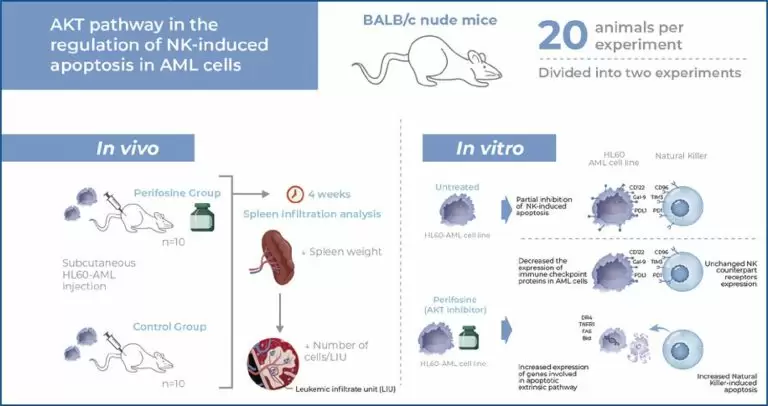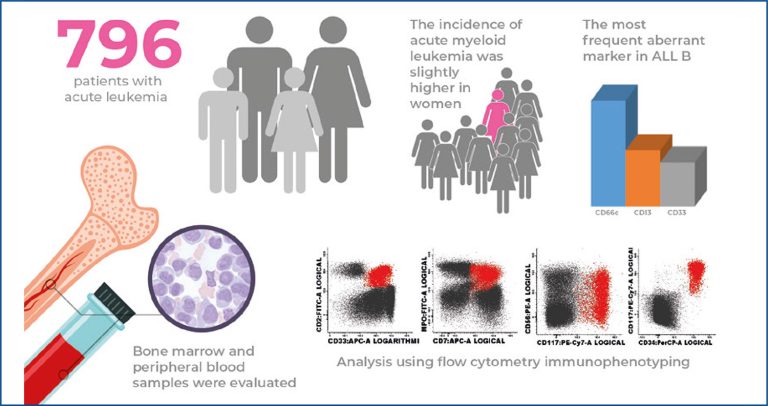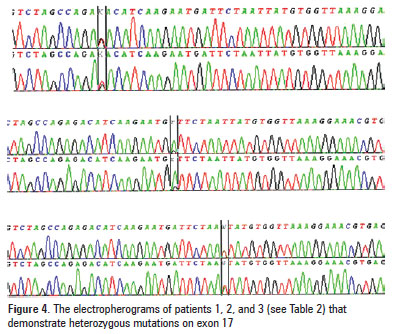06/Jun/2023
AKT inhibition interferes with the expression of immune checkpoint proteins and increases NK-induced killing of HL60-AML cells
DOI: 10.31744/einstein_journal/2023AO0171
Highlights ■ AKT signaling sustains the immune evasion mechanisms in acute myeloid leukemia. ■ AKT inhibition increases the susceptibility of acute myeloid leukemia cells to natural Killer-mediated apoptosis. ■ Partial blockage of AKT signaling promotes the suppression of PDL1 and overexpression of pro-apoptotic genes. ABSTRACT Objective To determine the role of the AKT pathway in the regulating of natural Killer-induced apoptosis of acute myeloid leukemia cells and to characterize the associated molecular mechanisms. Methods BALB/c nude mice were injected with […]
Keywords: AKT; Gal-9; Killer cells, natural; Leukemia, myeloid, acute; PD-L1
19/Dec/2022
Immunophenotypic characterization of acute leukemias in Bahia, Brazil
DOI: 10.31744/einstein_journal/2023AO0117
Highlights The incidence of acute myeloid leukemia was slightly higher in women. The most frequent aberrant marker in B-cell ALL was CD66c, followed by CD13 and CD33. Expression of CD34, HLA-DR, CD13, MPO, CD15, CD64, CD2 and CD7 was different in the non-APL and APL AML groups. Differences in expression of CD10, CD13, CD33, CD66c and CD34 were observed in different age groups with B-cell ALL. ABSTRACT Objective To characterize the immunophenotypic profile of acute leukemias in the population […]
Keywords: Acute myeloid leukemia; Flow cytometry; Immunophenotyping; Leukemia; Leukemia, myeloid, acute; Precursor B-cell lymphoblastic leukemia-lymphoma
23/Feb/2022
MicroRNAs and exosomes: promising new biomarkers in acute myeloid leukemias?
DOI: 10.31744/einstein_journal/2022RB5954
ABSTRACT Despite advances in understanding of carcinogenesis and of treatment of acute myeloid leukemia, this neoplasm still has a lethality of at least 30%. The search for biomarkers that can predict the response to treatment in the early stages of the disease is still necessary. In recent years, a new form of cellular communication between tumor and non-neoplastic cells has been discovered: the exchange of information through extracellular vesicles. These are small vesicles released by membrane-coated cells that carry proteins, […]
Keywords: Biomarkers; Exosomes; Immunomodulation; Leukemia, myeloid, acute; MicroRNAs
29/Oct/2012
The detection of KIT mutations in acute myeloid leukemia
DOI: 10.1590/S1679-45082012000300005
OBJECTIVE: This study describes a new method used in the clinical laboratory at Hospital Israelita Albert Einstein to detect mutations in exons 8 and 17 of the KIT gene in patients with acute myeloid leukemia. METHODS: Genomic DNA extraction was performed on 54 samples of peripheral blood or bone marrow from patients with acute myeloid leukemia. The extracted DNA was amplified by polymerase chain reaction and sequenced, and the fragments were analyzed. RESULTS: Within the analyzed samples, we detected four […]
Keywords: Core binding factors; Gene expression; Leukemia, myeloid, acute; Receptor protein-tyrosine kinase





